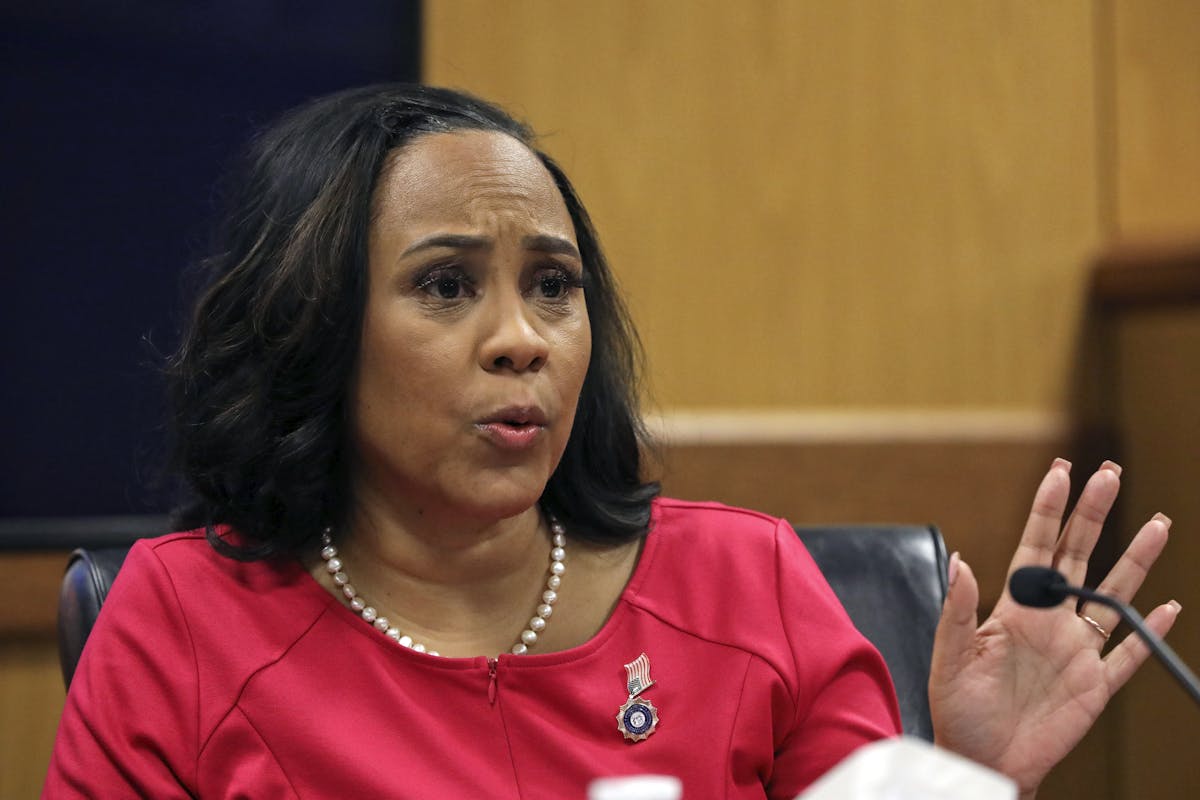Secret Hearing Could Decide If Fani Willis Gets To Prosecute Trump — or If She’s Removed Over ‘Improper’ Romance
A judge wants a closed door session to determine when the relationship between the district attorney and the lawyer she hired as her special prosecutor began.

A secret hearing at Georgia’s Fulton County could decide whether District Attorney Fani Willis will be allowed to try the sprawling racketeering case she brought against President Trump and 18 others.
The case has run aground on allegations made by a handful of defendants, including Mr. Trump, that the Fulton County district attorney is entangled in a disqualifying conflict of interest stemming from an “improper, clandestine personal relationship” with the case’s special prosecutor, Nathan Wade, whom she hired to lead the prosecution.
Judge Scott McAfee noted last week that he wants to meet with a key witness, the lawyer Terrence Bradley, “ex parte in camera.” Such a meeting involves the judge meeting with only one of the parties to a case behind closed doors. Mystery surrounds the session. An attorney for Mr. Trump, Steven Sadow, tells the Sun that as far as he knows, a date for the session has not been set.
The lawyer leading the disqualification push, Ashleigh Merchant, alleges that a former law partner of Mr. Wade’s, Mr. Bradley, possesses “non-privileged, personal knowledge that the romantic relationship between Wade and Willis began prior to Willis being sworn in as district attorney for Fulton County, Georgia in January 2021.” If true, that would mean both prosecutors are lying.
Eliciting that testimony, though, proved more difficult than shucking an oyster in an ice storm. Mr. Bradley invoked attorney-client privilege, an ancient prerogative under common law, to avoid sharing what he knows of the romantic relationship. Mr. Bradley also served as Mr. Wade’s attorney in divorce proceedings against his wife of 26 years, Joycelyn.
In a twist that dragged the case further into the gutter, Mr. Bradley admitted on the stand that he left Mr. Wade’s firm after being accused of sexual assault by an employee. The lawyer for Mr. Trump, Mr. Sadow, accuses Mr. Wade of having perpetrated “fraud upon the court,” or lying under oath about the relationship timeline. If the judge finds that Mr. Wade is lying, then the protections of attorney-client privilege could give way under the crime-fraud exception, which ordains that lawyerly work performed in furtherance of a crime forfeits the traditional protections.
One of the matters on which Judge McAfee is likely to want clarification is the exchange of text messages between Ms. Merchant and Mr. Bradley, a correspondence alluded to in open court last week. The judge admitted to “some uncertainty” as to whether Mr. Bradley’s expansive invocation of attorney-client privilege is warranted.
Their textual exchange appears to be a factor in leading Ms. Merchant to believe that the relationship between Mr. Wade and Ms. Willis predates his hiring by Ms. Willis for the racketeering case against Mr. Trump and others.
Those unanswered questions persist despite two full days of testimony last week from Ms. Willis, her former boyfriend, Mr. Wade — the couple say their romance has ended — and other characters, comprising the district attorney’s ex-Black Panther father and her former friend, now at odds with Ms. Willis, from her “party” days at Howard University. The defendants seeking to disqualify Ms. Willis and Mr. Wade argue that they dated before he was hired and that the more than $650,000 he has been paid was used to fund luxury vacations the pair took together.
These jaunts included cruise ships, island getaways, and a visit to a tattoo parlor at Belize. In recent days, there surfaced the reflections of a vineyard “estate ambassador,” Stan Brody, at Acumen Wines, at Napa Valley. He tells CNN that he rang up a purchase for the pair and “was expecting a credit card quite frankly. And she says I’ll pay cash. And so that was that.”
Ms. Willis maintains — under oath — that she only started a romantic relationship with Mr. Wade after he was hired to prosecute the case, and that she always paid him back with wads of cash. Her father told the court that keeping large amounts of cash at home is a “Black thing.” And in fiery testimony, Ms. Willis, who is a divorced mother of two, described how, for her, a “man is not a plan” and how her relationship with Mr. Wade was motivated by a desire for companionship, not financial gain.

